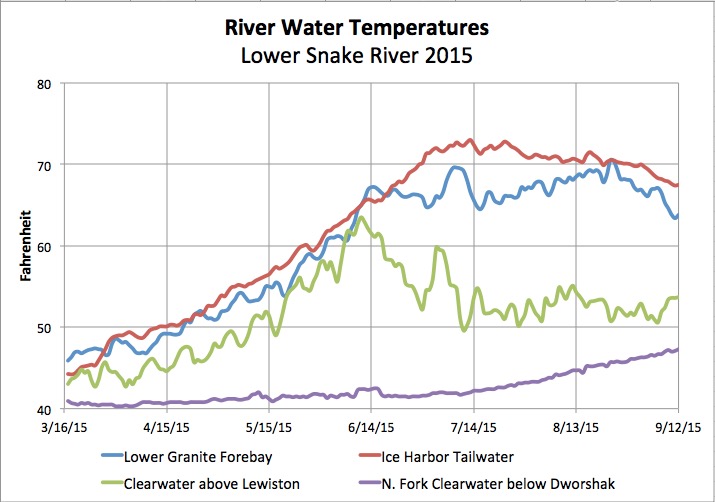forum
library
tutorial
contact

State Climatologist says the Declining Snowpack
Threatens Water Supplies as Population Grows
by Julie Titone
The Daily News, October 19, 2020
|
the film forum library tutorial contact |

|
State Climatologist says the Declining Snowpack
by Julie Titone
|
Dams hold back cold water that can be released to help fish survive hot summers;
some dam improvements have demonstrably helped fish, and carbon-free hydropower is sorely needed.
 Washington State Climatologist Nick Bond is such a Pacific Northwesterner that he feels a little sad whenever it stops raining. He wants Western Washington to remain the place he has known since arriving at the University of Washington 40 years ago. He knows it won't, thanks to climate change.
Washington State Climatologist Nick Bond is such a Pacific Northwesterner that he feels a little sad whenever it stops raining. He wants Western Washington to remain the place he has known since arriving at the University of Washington 40 years ago. He knows it won't, thanks to climate change.
"By the middle of this century, for most systems, there will be no looking back. The very warmest conditions now will be the routine conditions then. The warm years will be something we haven't seen," Bond said. "It's not going to be uninhabitable. We're not doomed, but we're moving into uncharted territory."
As temperatures climb, Bond said, different trees will thrive and there will be a different mix of crops in the North Puget Sound. There will be -- and already are -- winners and losers in the animal kingdom.
Bond is a University of Washington research scientist whose state title means he spends a quarter of his time communicating with the public about climate issues. He's quick to point out that Washington has been warming for decades. For example, steadily increasing summer nighttime temperatures have altered the pleasure of throwing open a window for good sleeping.
Decreasing mountain snowpack is Bond's biggest concern. That threatens downstream water supplies, both in quantity and timing of runoff. Reservoirs such as Spada Lake, which provides Everett's drinking water, might not fill -- even as the region's population keeps growing.
Peaks above 6,000 feet still will have snow by mid-century, he said, "but there's not much of the Cascades above that." The elevation of Stevens Pass is 4,061 feet. "I'm not telling you not to get a ski pass next year. But even with good snow for the last four years, we had pretty early snow melt in 2017-18."
Early snow melt can bring destructive flooding. In some years already, there has been less snow to melt. In 2015, there was a double climate whammy: low snowpack and a warmer-than-usual early summer. That year's record run of salmon had trouble reaching spawning beds, Bond said.
"That caught us by surprise. That will be typical in the 2050s."
Even if rivers are high enough for salmon to spawn, they're less likely to do so in warmer water. The Puget Sound's resident orcas are at risk of extinction because wild salmon are, too. Meanwhile, sea lions, which compete for the salmon, are increasing along with temperatures.
Bond often speaks to the public about climate change and its impact on salmon. That inevitably leads to a discussion of the removal of Snake River dams, which environmentalists consider the best hope for restoring salmon populations. Bond points out that, while they are barriers to migration, dams hold back cold water that can be released to help fish survive hot summers; some dam improvements have demonstrably helped fish, and carbon-free hydropower is sorely needed.
So some people are unhappy about his arguments against dam removal, while others dispute his message that climate change is real and is human-caused.
"I get just as much pushback from liberal audiences as conservative ones."
Bond meets fewer climate change skeptics these days. People know it's happening, he said, but believe it's too expensive to deal with. Or they have other things to worry about. Bond and his colleagues at the UW Climate Impacts Group have documented changes in their lifetimes that normally take thousands, if not millions, of years to occur. That puts climate change high on the climatologist's list of worries.
"We ignore it at our own peril."
Related Pages:
Columbia, Snake River Dam Operators Must Make Plan to Keep Waters Cold Enough for Salmon Survival by Jeremy P. Jacobs, E&E News, 3/30/20
Court Orders EPA to Write Temperature Control Plans for Columbia, Snake by George Plaven, Capital Press, 12/27/19
Federal Appeals Court Orders EPA to Create Plan to Lower Water Temperatures on Columbia River by Evan Bush, Seattle Times, 12/20/19
Court says EPA Must Regulate River Temperatures for Fish by Jeremy P. Jacobs, E&E News, 12/20/19
learn more on topics covered in the film
see the video
read the script
learn the songs
discussion forum
